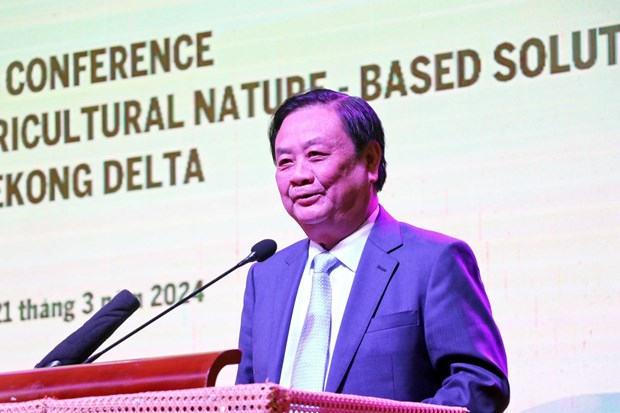Conference mobilises resources for nature-based agricultural development
Conference mobilises resources for nature-based agricultural development Viet Nam News


Minister of Agriculture and Rural Development Calls for Support in Nature-Based Agriculture

|
| Minister of Agriculture and Rural Development Le Minh Hoan. — VNA/VNS Photo |
CÀ MAU — Minister of Agriculture and Rural Development Lê Minh Hoan on March 21 called on international partners to support the Vietnamese Government in carrying out nature-based agricultural models and projects in the Mekong Delta which has been hard hit by climate change.
Attending a conference on mobilising resources for nature-based agriculture held in Cà Mau province, the minister laid stress on the significance of nature-based solutions to improving farmers’ livelihoods and promoting the agricultural sector’s recovery, adding the approach helps mitigate and respond to climate change through the process of carbon absorption of land, wetland and forest, preserve nature and biodiversity, and maintain the future for food system.
Against this backdrop, agricultural producers should stand ready to shift to production measures that can restore nature while developing an effective and sustainable food system, he said.
Nature-Based Solutions for Sustainable Agriculture
Director of WWF-Vietnam Van Ngoc Thinh said that the WWF and its partners have implemented several nature-based solutions in the Mekong Delta region such as rice-fish, rice-shrimp, rice-lotus and shrimp-mangrove forest farming, which have shown economic efficiency while contributing to preserving biodiversity.
The WWF is willing to share the models with a view to developing agriculture sustainably and ensuring people’s health, he added.
International Support for Nature-Based Measures
At the event, international partners like the EU, the US, Australia, FAO, UNDP, WWF, international financial funds, and domestic and foreign enterprises committed resources to roll out nature-based measures in the region.
They recommended economic, technical and financial solutions, and related mechanisms and policies to promote nature-based agriculture in Vietnam and bolster international cooperation in the field.
Challenges Faced by the Mekong Delta
The Mekong Delta contributes more than 90% of the country’s rice exports, and plays an important role in ensuring global food security as Vietnam is now the world’s third largest rice exporter. The region is also rich in biodiversity with an array of ecosystems, from oceans, rivers and streams to mangrove forest islets and wetlands.
However, it is facing various challenges, including drought, saline intrusion and climate change which have affected local production and livelihoods. The region could be submerged by the end of the century if urgent actions are not taken across the river basin.
Scientists also said that 90% of the region’s land will be flooded if sustainable measures are not put into place. — VNS
SDGs, Targets, and Indicators
-
SDG 2: Zero Hunger
- Target 2.4: By 2030, ensure sustainable food production systems and implement resilient agricultural practices that increase productivity and production, that help maintain ecosystems, that strengthen capacity for adaptation to climate change, extreme weather, drought, flooding, and other disasters, and that progressively improve land and soil quality.
- Indicator: The article mentions the need for agricultural producers to shift to production measures that can restore nature while developing an effective and sustainable food system.
-
SDG 13: Climate Action
- Target 13.1: Strengthen resilience and adaptive capacity to climate-related hazards and natural disasters in all countries.
- Target 13.2: Integrate climate change measures into national policies, strategies, and planning.
- Indicator: The article highlights the impact of climate change on the Mekong Delta region and the need for nature-based solutions to mitigate and respond to climate change.
-
SDG 15: Life on Land
- Target 15.1: By 2020, ensure the conservation, restoration, and sustainable use of terrestrial and inland freshwater ecosystems and their services.
- Target 15.5: Take urgent and significant action to reduce the degradation of natural habitats, halt the loss of biodiversity, and protect and prevent the extinction of threatened species.
- Indicator: The article mentions the implementation of nature-based solutions in the Mekong Delta region, such as rice-fish, rice-shrimp, rice-lotus, and shrimp-mangrove forest farming, which contribute to preserving biodiversity.
-
SDG 17: Partnerships for the Goals
- Target 17.6: Enhance North-South, South-South, and triangular regional and international cooperation on and access to science, technology, and innovation and enhance knowledge sharing on mutually agreed terms, including through improved coordination among existing mechanisms.
- Indicator: The article mentions the commitment of international partners like the EU, the US, Australia, FAO, UNDP, WWF, international financial funds, and domestic and foreign enterprises to roll out nature-based measures in the Mekong Delta region.
Table: SDGs, Targets, and Indicators
| SDGs | Targets | Indicators |
|---|---|---|
| SDG 2: Zero Hunger | Target 2.4: By 2030, ensure sustainable food production systems and implement resilient agricultural practices that increase productivity and production, that help maintain ecosystems, that strengthen capacity for adaptation to climate change, extreme weather, drought, flooding, and other disasters, and that progressively improve land and soil quality. | The article mentions the need for agricultural producers to shift to production measures that can restore nature while developing an effective and sustainable food system. |
| SDG 13: Climate Action | Target 13.1: Strengthen resilience and adaptive capacity to climate-related hazards and natural disasters in all countries. Target 13.2: Integrate climate change measures into national policies, strategies, and planning. |
The article highlights the impact of climate change on the Mekong Delta region and the need for nature-based solutions to mitigate and respond to climate change. |
| SDG 15: Life on Land | Target 15.1: By 2020, ensure the conservation, restoration, and sustainable use of terrestrial and inland freshwater ecosystems and their services. Target 15.5: Take urgent and significant action to reduce the degradation of natural habitats, halt the loss of biodiversity, and protect and prevent the extinction of threatened species. |
The article mentions the implementation of nature-based solutions in the Mekong Delta region, such as rice-fish, rice-shrimp, rice-lotus, and shrimp-mangrove forest farming, which contribute to preserving biodiversity. |
| SDG 17: Partnerships for the Goals | Target 17.6: Enhance North-South, South-South, and triangular regional and international cooperation on and access to science, technology, and innovation and enhance knowledge sharing on mutually agreed terms, including through improved coordination among existing mechanisms. | The article mentions the commitment of international partners like the EU, the US, Australia, FAO, UNDP, WWF, international financial funds, and domestic and foreign enterprises to roll out nature-based measures in the Mekong Delta region. |
Behold! This splendid article springs forth from the wellspring of knowledge, shaped by a wondrous proprietary AI technology that delved into a vast ocean of data, illuminating the path towards the Sustainable Development Goals. Remember that all rights are reserved by SDG Investors LLC, empowering us to champion progress together.
Source: vietnamnews.vn

Join us, as fellow seekers of change, on a transformative journey at https://sdgtalks.ai/welcome, where you can become a member and actively contribute to shaping a brighter future.







